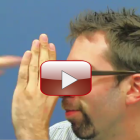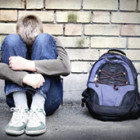
Visualizing ‘Generation Text’ [infographic]
|
"How would you feel if you couldn't text for a day?" Lab 42 asked a survey group of American teenagers. The teens weren't too concerned. After all, they would still have Facebook.
Juvenile Justice Information Exchange (https://jjie.org/tag/youth/page/8/)

"How would you feel if you couldn't text for a day?" Lab 42 asked a survey group of American teenagers. The teens weren't too concerned. After all, they would still have Facebook.

What's one of the biggest drivers pushing kids into the juvenile justice system these days? Schools. Schools often suspend or expel youth who misbehave, ostensibly to maintain order. Unfortunately, an analysis of 30 years of data on middle school expulsions and suspensions issued last year by the Southern Poverty Law Center found that the sanctions were unfair and ineffective. So what can be done?

Does it really matter if we screen and assess teens for alcohol and drug problems? Most adults, after all, started experimenting with alcohol or other drugs before they turned 21 -- and if they didn't, they almost certainly knew a lot of kids who did. And most of them (though not all) survived into adulthood. So what's the big deal if we turn a blind eye to identify teen drinking or drugging? Federally-funded research shows why it's a big deal from a public health standpoint:
(Click the image for a larger view.) It's taken from an excellent presentation, "Characteristics, Needs and Strengths of Substance Using Youth by Level of Involvement in the Juvenile Justice System," given by Dr. Michael Dennis, Senior Research Psychologist at Chestnut Health Systems, at the Reclaiming Futures Leadership Institute held in Miami last month. I'll be posting more slides from his presentation soon - stay tuned! Here's Dr. Dennis' notes on the slide (emphasis added):
This figure shows ...

“You got any weed?” is how William “Trash” Hansen introduced himself on a hot spring day in the Little 5 Points neighborhood of Atlanta. The heels of his socks peeked through the disintegrated soles of his steel-toed boots as he walked the strip in search of the drug. If you passed him on the street you may have thought twice before striking up a conversation. If the soot- drenched, patch- woven outfit didn’t give you pause, the blatant drug references and casual cat-calls may have. Sporadically he’d push back the small puff of dreadlocked hair sprouting from the crown of his head or run his arm across his forehead to wipe away sweat.

Isn't it great when you see a young person beat the odds? You know what I mean -- you'll read a story or see a video about a teen who struggled with drugs, alcohol, and crime, and somehow overcame all of that (and probably more) ... and it just makes you feel fantastic, doesn't it? Well, it should. But Karen Pittman, CEO and Founder of the Forum for Youth Investment, has an even more inspiring idea, which she shared in an interview at the Reclaiming Futures Leadership Institute held in Miami in May:
You can also see Karen's full presentation at the Reclaiming Futures Leadership Institute here.

Central Florida’s Polk County has become the first jurisdiction in that state to make plans under a new state law to house juveniles who are awaiting trial in adult jail rather than in a state juvenile detention center, according to NewsChief.com, a Winter Haven, Fla., news site. That change was made possible because Polk Sheriff Grady Judd pushed state Sen. J.D. Alexander, R-Lake Wales, to sponsor a bill in this year’s Florida Legislature that loosens the standards county jails must meet to house juveniles. The state currently charges counties $237 per day to hold each juvenile in pretrial detention, and that rate is expected to rise later this year. Judd told NewsChief.com that the county expects to spend $70-$90 per day per juvenile detainee. He predicts the switch will save the county around $1.5 million.

The girl is maybe 15 years old? She is standing in the back of a building, or maybe it’s an alley way. She has her arms wrapped around her body and her teeth are chattering. When the officer approaches and tells her to leave the alley way she shakes her head and refuses. The officer moves in closer and reiterates his order to leave. Suddenly the girl is lunging at him, screaming, “Don’t touch me! Don’t touch me! Get away from me!” She is pushing her hands out at him, then pointing her finger at the officer, ordering him to keep his distance.

Teenagers and college students live in tumultuous times. Physical changes, high school graduation, going off to college, moving away from the parents — all of these things can cause personality and mood changes in young adults. So how does one know the difference between “normal” bouts of depression, sadness and erratic behavior, and what could potentially be a red flag for suicidal tendencies? Every 15 minutes (about the amount of time that it takes to down a cup of coffee) one person will commit suicide, according to The American Foundation for Suicide Prevention. Many of these deaths could have been prevented by intervention from those close to the victims, but often the warning signs were ignored because the subject is awkward, according to Mary Ann Camann, PhD, an associate professor at the WellStar School of Nursing at Kennesaw State University near Atlanta.

"Defending Childhood" Public Service Announcement to Star Attorney General
Memo to Wile E. Coyote: Violence Won't Make Kids Like You
One Man's Journey Through Crime, Drugs, Schizophrenia and Rehabilitation
Hornberger Advice: Juvenile Offenders Need Alternatives to Prisons
Juvenile Justice Expert David Schmidt Discusses Juvenile Life Without Parole

The Department of Health and Human Services, The Administration for Children and Families, The Administration on Children, Youth and Families, is offering the Runaway and Homeless Youth Street Outreach Program. The goal is to assist children who fall victim to exploitation and abuse on the streets. The objective is to increase the safety, wellbeing and self-sufficiency of homeless youth. This is accomplished by building connections with them so organizations can help provide for the child’s immediate physical needs while helping improve behavioral and psychological health for them. The deadline is June 24, 2011.